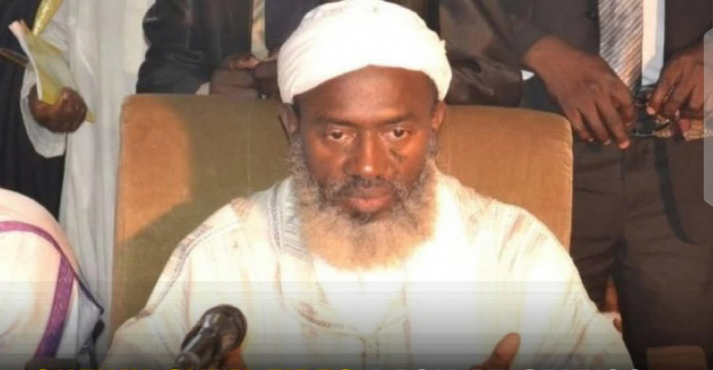
Gumi Breaks Silence: Cleric Slams Critics, Says Calls for His Arrest Are Rooted in “Ignorance, Hate and Bigotry”

Sheikh Ahmad Gumi has once again taken center stage in Nigeria’s security discourse, firing back sharply at critics demanding his arrest over his frequent commentary on banditry and the country’s worsening insecurity. In a strongly worded statement shared on his Facebook page on Sunday, the popular Islamic cleric dismissed the renewed calls as nothing more than a reflection of deep-seated intolerance, ignorance and bigotry disguised as public concern.
Gumi, who has been a controversial figure for his continued insistence on dialogue with armed groups, did not hold back in his response. He described those accusing him of having ties to criminals as “spineless, irresponsible and unpatriotic imbecilic people” who are more interested in emotional theatrics than genuine solutions to the raging security crisis. According to him, the loudest voices attacking him are individuals who simply cannot stand alternative ideas on how to address the violent activities that have plagued Northern Nigeria for over a decade.
He insisted that nothing he has done warrants arrest or suspicion, maintaining that his engagement with armed groups was always transparent, supervised and nationally motivated. “Many of those shouting today do not even understand the complexity of the issues they comment on,” he wrote, emphasizing that engagement is not endorsement and dialogue is not criminality.
Citing one of his most publicized interventions, Gumi recalled his January 2021 peace outreach to the Sabon Garin Yadi forest in Giwa Local Government Area of Kaduna State. That mission, he stressed, was not clandestine but was carried out openly with the full knowledge of the government and security authorities. He pointed out that he did not travel alone into the forest; he was accompanied by senior security officials, including the then Kaduna State Commissioner of Police, who represented the Inspector-General of Police. This, he argued, is proof that his dialogue efforts were supported at the highest levels at the time.
According to Gumi, the January 2021 meeting yielded significant progress as more than 600 armed bandits and their commanders agreed to surrender their weapons, reintegrate into society, and embrace peace—on the condition that government fulfilled certain basic commitments. These conditions, he said, included the provision of social amenities, fair treatment, and an end to what he described as arbitrary arrests of suspects after negotiations.
The cleric expressed disappointment that the government failed to honour its part of the agreement, resulting in the breakdown of the peace initiative. He lamented that what could have been a turning point in the fight against banditry was squandered, not because the armed groups refused peace but because political will was lacking. “We cannot keep calling for peace if we are not willing to sustain it with action,” he wrote.
Gumi questioned why making efforts to save lives should ever be grounds for arrest, stressing that dialogue has been used globally to resolve worse conflicts. He argued that if meeting with armed groups to negotiate peace is considered a crime, then the country is not ready for real solutions. He insisted that those attacking him are blinded by prejudice and are more interested in silencing voices they dislike than securing the nation.
He warned that suppressing alternative viewpoints is one of the fastest ways to empower insecurity, noting that complex national crises require broad perspectives and not uniform thinking. According to him, branding every unconventional opinion as criminal only discourages constructive engagement and stifles innovation in national problem-solving. He added that peacebuilding is often messy, misunderstood and unpopular, but it remains necessary.
Gumi reiterated that advocating dialogue is not a crime under any law and should not be portrayed as such. He insisted that the demonization of those who propose non-military strategies is part of why Nigeria’s security challenges continue to escalate. He argued that the country needs both force and conversation, both pressure and persuasion, if it truly hopes to restore peace.
He also criticized what he described as a growing culture of intolerance, where citizens attack one another for simply having different opinions. He expressed concern that Nigeria is dangerously drifting into a society where freedom of expression is selectively applied, reserved only for those who parrot popular sentiments. He emphasized that real progress is impossible without the ability to debate, challenge and question.
In concluding his message, the cleric offered a prayer for national unity and wisdom, stressing that bigotry and intellectual intolerance are far more dangerous to Nigeria than divergent opinions. “May Allah protect our nation from bigotry and from those who cannot tolerate opposing opinions,” he wrote, framing the issue not merely as a personal defense but as a broader warning about the nation’s fragile social fabric.
As reactions continue to pour in across social media and political circles, Gumi’s comments have already reignited heated debates about the best path forward in resolving Nigeria’s worsening security crisis. While his supporters applaud him for speaking uncomfortable truths, critics argue that his engagements embolden criminal elements. Yet, with his latest statement, one thing is clear: Sheikh Ahmad Gumi has no intention of backing down from his belief that dialogue must remain part of Nigeria’s search for peace, regardless of who disapproves.
The unfolding conversation around his remarks is likely to shape renewed national dialogue about the balance between crackdowns and negotiations, state power and citizen initiative, and the role of unconventional actors in resolving deeply rooted conflicts. Whether praised or condemned, Gumi’s voice continues to provoke reflection on what Nigeria must do to find lasting stability in an increasingly turbulent environment.


